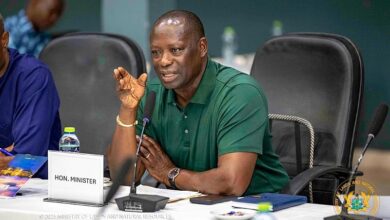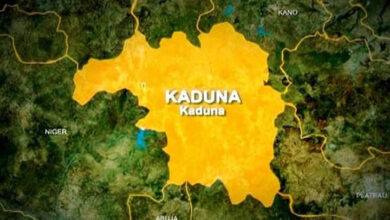UNU-INRA holds 7th Adum Kwapong Lecture, advocates opportunity for green industrialisation of critical minerals
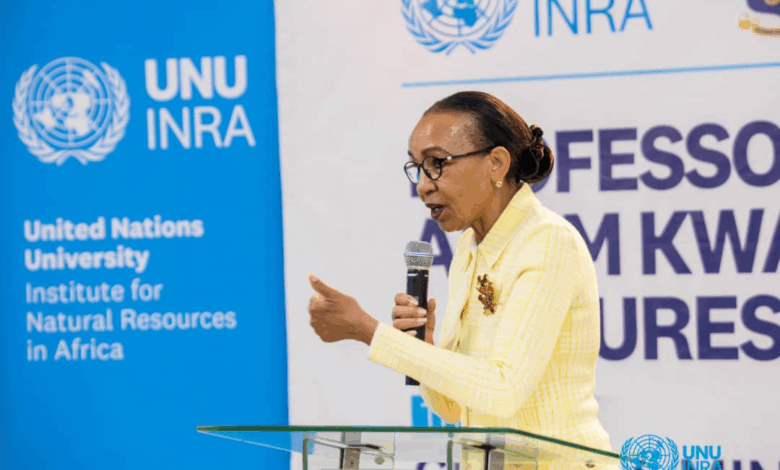
The United Nations University Institute for Natural Resources in Africa (UNU-INRA) has held the seventh edition of the Professor Alexander Adum Kwapong Lecture Series, popularly known as the Nature Speaks Kwapong Lectures, in Accra on November 6.
This year’s edition, held on the theme “Critical Minerals: A New Scramble or Opportunity for Green Industrialisation in Africa,” brought together global thought leaders, researchers, and policymakers to explore how Africa’s mineral wealth can catalyse sustainable green industrialisation.
The lecture honours the late Professor Alexander Adum Kwapong, the first Ghanaian Vice-Chancellor of the University of Ghana and the first African Vice-Rector of the United Nations University, whose legacy of scholarship and leadership continues to inspire generations across the continent.
Rethinking Africa’s Mineral Future
Delivering the keynote address, Mrs Sheila Khama, a Non-Executive Director with FTSE, Nasdaq, Saudi Stock Exchange, and AXS-listed companies, called for a rethinking of Africa’s approach to its critical minerals, not as mere raw exports, but as foundations for value addition, innovation, and transformation.
She observed that critical minerals such as cobalt, lithium, graphite, platinum, and bauxite are indispensable to the global green transition, powering electric vehicles, renewable energy systems, and digital technologies and also vital for Africa’s own green industrial revolution.
“The story of Africa’s critical minerals can unfold in one of two ways: as a new scramble defined by external interests or as a new renaissance driven by African innovation, ownership, and green transformation,” she said.
“The choice lies in how we govern, cooperate, and use knowledge to shape our shared future.”
Partnerships for Knowledge and Transformation
In her opening remarks, Professor Nana Aba Appiah Amfo, Vice-Chancellor of the University of Ghana, praised the collaboration between UNU-INRA and the University of Ghana, describing it as “a model of how academic and policy institutions can work hand in hand to address the continent’s most pressing challenges.”
“Together, we think critically about complex development problems, co-produce transformative research, and co-create new spaces for thought leadership on natural resource governance, climate resilience, and sustainable industrialisation,” she stated.
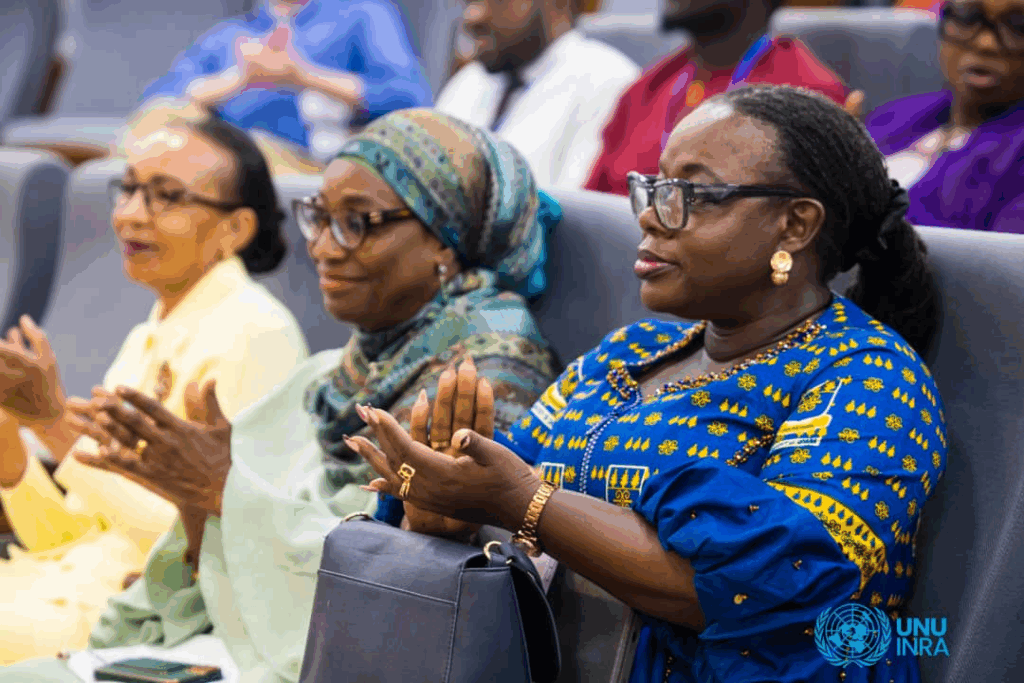
She emphasised that joint initiatives from research projects to training and mentorship programmes are essential to bridge the gap between science and policy, generating actionable knowledge for Africa’s sustainable future.
Africa’s Data-Driven Pathway to Sustainable Mining
Speaking on behalf of the United Nations system in Ghana, Resident Coordinator H.E. Zia Choudhury commended UNU-INRA’s Critical Minerals Information and Knowledge Hub (C-MINK), an innovative platform designed to strengthen Africa’s capacity to manage its mineral wealth strategically and sustainably.
“C-MINK represents a bold, Africa-led effort to provide reliable data, analysis, and policy support,” he said.
“It complements frameworks such as the African Mining Vision and the AfCFTA, helping governments negotiate from a position of knowledge and strength.”
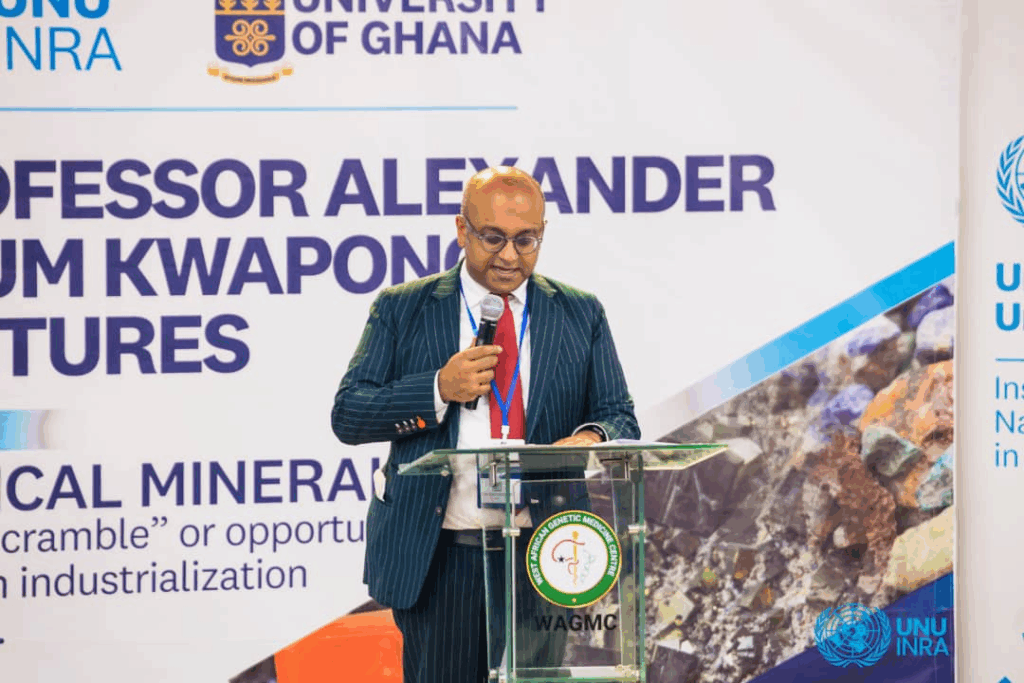
The initiative is also anchored in strong environmental and social safeguards, ensuring that mineral development contributes to inclusive, equitable, and sustainable growth, fully aligned with the 2030 Agenda for Sustainable Development.
From Extraction to Empowerment
In her closing remarks, Dr Fatima Denton, Director of UNU-INRA, reaffirmed the Institute’s commitment to advancing African-led research and policy innovation in natural resource governance.
She said the Kwapong Lecture Series continues to serve as a platform for reflection, dialogue, and practical action, ensuring that Africa’s resources become levers for transformation and shared prosperity, rather than tools of dependency.
“Managed wisely, Africa’s critical minerals can be critical for the planet, critical for prosperity, and critical for the promise of a just transition,” Dr Denton noted.
DISCLAIMER: The Views, Comments, Opinions, Contributions and Statements made by Readers and Contributors on this platform do not necessarily represent the views or policy of Multimedia Group Limited.
DISCLAIMER: The Views, Comments, Opinions, Contributions and Statements made by Readers and Contributors on this platform do not necessarily represent the views or policy of Multimedia Group Limited.
Source link

